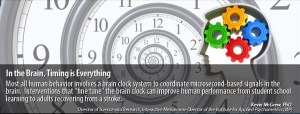What Exactly is Temporal Order and Why Does it Matter So Much?
/Temporal order, according to the dictionary, is simply “the arrangement of events in time.”
If you are adept at judging temporal order you can process information in a way that allows you to move forward and backward through time mentally.
Temporal order allows us to predict what happens next, to consider our responses, and to react in an appropriately timed way.
But what if your ability to mentally arrange events in time is disrupted or impaired?
Research shows us that people with clinical disorders like autism, ADHD, and dyslexia tend to be significantly right-brained. Studies also show us that the ability to correctly judge temporal order is a function of the leftfrontal lobe of the brain.
So, the time perceptions and discrepancies discovered in children with these disorders is a vital consideration when trying to understand these disorders and symptoms like impulsivity, memory, and motor-control.
Temporal Order is a Developmental Skill.
How does a person learn to correctly estimate time?
Keeping or measuring time develops throughout early childhood. Young children have trouble keeping track of when things happened or how long they have to wait before participating in an activity. Temporal order is significantly limited compared to that of an adult.
Usually, the ability to understand timing grows, a selective working memory based on experience and increased ability to manage time develops, and fewer misunderstandings or errors in temporal order judgment occur.
When this sense of time is impaired, there can be long-term cognitive, behavioral, and physical functioning fallout that affects a person.
What Are We Learning about the Importance of Temporal Order Processing?
- In the case of ADHD, it is scientifically clear the disorder impairs the sense of time significantly. Studies of children with ADHD who are given “time estimation tasks” reveal that time passes very slowly for them. This delay makes appropriate behavioral, social, and physical responses challenging. Matching their busy thoughts and actions to their perception of time events is difficult.
- A 2004 study found that 76% of the children with dyslexia struggled to process temporal information too. Research indicates that dyslexic ability to process the order of speech components in a timely fashion is significantly delayed, affecting comprehension.
- Recent autism research indicates that many people on the Autism Spectrum display time-affected symptoms as well. Problematic information processing, attention deficit, the inability to shift focus, conversation struggles, sensory disintegration, and motor coordination issues seem to correlate with known temporal processing disruption though more research is needed.
- According to a 2003 study in the Journal of Speech, Language and Hearing Research, effective processing in the brain of time-oriented information must occur for people to correctly understand what is being said. A disrupted sense of time affects sound perception, comprehension of verbal directions, reading ability, and attention.
- A 2002 study published in Brain and Cognition, supports findings that indicate specific regions of the brain associated with timing and understanding temporal order are also connected to focus, successful attention shifting, as well as bodily coordination.
An impaired ability to sort through and arrange events in time disrupts the regulation and comprehension of information. Thoughts become disorganized and distracted.
Working memory becomes compromised because incorrect temporal order processing and judgment keeps the mind too full of unhelpful information.
The ability to properly arrange and employ appropriate information is delayed.
The body becomes uncoordinated as it attempts to arrange its action with the brain’s assessment of time.
Interactive Metronome (IM) effectively measures and improves the brain’s ability to correctly judge temporal order. Working to treat this issue will assist all areas of function that depend upon internal timing: speech, language, cognitive, motor, and social/behavioral skills.

